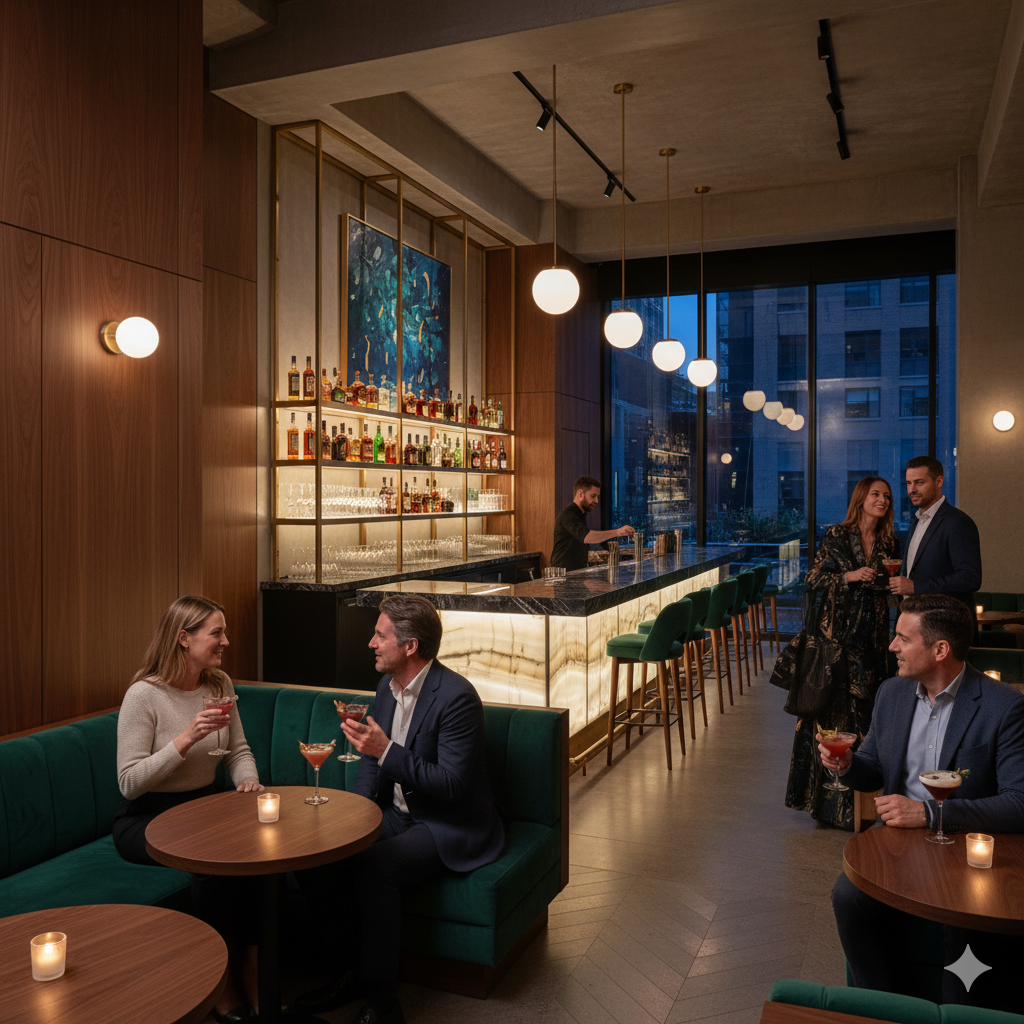In Tokyo’s night culture, live jazz is a carefully staged experience: **seated listening** with table service in clubs, or **standing/close-up** sessions in compact “live houses.” Floor plans emphasize stage sightlines, low lighting, and direct service corridors so sets start on time. Interaction is ritualized: check-in, minimum order or one-order rule, two sets with an intermission, last orders, then a punctual close. Audiences are mixed—locals and travelers from their 20s to 60s—often splitting between premium dinner shows and casual neighborhood jam nights. In this field guide we treat jazz clubs in Tokyo Japan as part of the city’s cultural infrastructure and show how to use it smoothly.
- 1. Overview: what makes Tokyo’s jazz clubs unique?
- 2. Top Areas & Access: where should you start?
- 3. Prices, Time & Eligibility: how much and what to expect on fees?
- 4. Venue Types & Services: dinner clubs vs. live houses vs. bars
- 5. Reservations, Etiquette & Useful Phrases
- 6. Summary and Next Steps
1Overview: what makes Tokyo’s jazz clubs unique?
1-1 Dinner clubs with reserved seating
At Blue Note Tokyo, reservations and seating are handled online/phone with clear steps; check-in precedes set times and the club enforces a one-order rule. See “How to reserve / payment & on-site flow” on the official page: ご利用の流れ|BLUE NOTE TOKYO. Cotton Club in Marunouchi also details the reservation flow and payment split—music/seat charge in advance online (or with phone payment at the venue) and food/drink on the day: Reservation|COTTON CLUB.
1-2 Classic live houses for hardcore jazz
Shinjuku Pit Inn, a legendary live house, sells tickets via its own web/phone/CN Playguide with clear pickup and fee instructions (e.g., convenience-store pickup fees, venue payment on phone reservations). Details: チケット|新宿PIT INN. BODY&SOUL in Aoyama publishes nightly schedules with indicated music charges (example listing shows a music charge ¥7,000 tax-in price noted on the event): ライブスケジュール|BODY&SOUL.
1-3 Casual bars & neighborhood rooms
Venues like Kichijōji Sometime provide accessible live sets (two sets, no rotation) with phone reservations, one-order policy, and published operating hours: お店について・Q&A|SOMETIME. Ueno’s Every Swing posts weekly sessions and explicitly lists a typical session charge of ¥2,500 with one drink included on “Service Session Day”: EVERY SWING 公式.
2Top Areas & Access: where should you start?
2-1 Omotesandō/Aoyama (Blue Note Tokyo)
Blue Note lists its address and states a walk of about 8 minutes from Tokyo Metro Omotesandō Station; see the official ACCESS page: ACCESS|BLUE NOTE TOKYO.
2-2 Marunouchi/Tokyo Station (Cotton Club)
Cotton Club publishes reservation details and hours on its official site; access is inside the Tokyo Building TOKIA (near Tokyo & Yurakuchō Stations). Use the official reservation page for operational info: Reservation|COTTON CLUB. (For general overview, see the club’s top page: COTTON CLUB 公式.)
2-3 Shinjuku & Kichijōji live clusters
Shinjuku Pit Inn publishes ticketing and priority entry notes on its site: PIT INN チケット. Kichijōji Sometime lists address, operating hours (12:00–22:00 overall; night live 19:00/20:30 sets), and phone booking: SOMETIME Q&A.
Table 2: Access & Hours
| Station | Walk Time | Typical Hours / Sets | Area (JP Link) |
|---|---|---|---|
| Omotesandō (Blue Note) | 8 min (official) | Evening shows; one-order rule | ACCESS (Japanese) |
| Tokyo/Marunouchi (Cotton Club) | 2–5 min from Tokyo Sta. area* | Evening shows; reserved seating | COTTON CLUB top |
| Shinjuku 3-chōme (Pit Inn) | 6–8 min (typical from E2) | Nightly sets; priority for reservations | Pit Inn ticket |
| Kichijōji (Sometime) | 5–7 min (north exit) | 1st 19:00 / 2nd 20:30 | Sometime Q&A |
*Exact walking minutes vary by exit; verify the club’s landmark on its official page before traveling. Figures above reflect the referenced official pages.
3Prices, Time & Eligibility: how much and what to expect on fees?
3-1 Examples from official pages (music/seat charges)
BODY&SOUL schedule listings show music charge examples like ¥7,000 (tax-in price noted), with open/1st/2nd set times on each event: BODY&SOUL スケジュール. Every Swing lists a Tuesday jam session music charge of ¥2,500 with one drink: EVERY SWING 公式. Cotton Club states that online bookings pay music/seat charge by card, while food/drink are paid on the day: COTTON CLUB 予約.
3-2 Doors, one-order, and service
Blue Note explains the one-order policy and check-in/escort/checkout sequence on its “How to use” page: ご利用の流れ|ブルーノート東京. Cotton Club also notes “one-order” and checkout flow on its reservation guide: ご利用の流れ|コットンクラブ.
3-3 Eligibility (age) & family policies
Cotton Club clarifies minors’ entry (for shows beginning before 20:30, elementary-to-under-18 may enter with a guardian; some shows excluded): see “Reservation” page notes: COTTON CLUB 予約. Each venue sets its own policy, so always confirm on the official schedule/FAQ.
Table 1: Venue Types & Base Fees
| Venue | Typical Charge | Sets / Time | Official (JP Link) |
|---|---|---|---|
| Blue Note Tokyo (Aoyama) | Variable by artist; reserved seating; one order | 2 sets nightly (typ.) | ご利用の流れ |
| Cotton Club (Marunouchi) | Music/Seat paid online; food/drink at venue | 1st/2nd shows | Reservation |
| Shinjuku Pit Inn | Event-by-event; venue or CN pick-up fees listed | Daily live bills | Ticket page |
| Kichijōji Sometime | Charge + one order (phone booking) | Two sets, no rotation | Q&A |
| BODY&SOUL (Aoyama) | ¥7,000 example on schedule | Open 18:30 / 1st 19:30 / 2nd 21:00 (example) | Schedule |
| Every Swing (Ueno) | ¥2,500 session (w/1 drink) | Jam nights weekly | Official |
Conclusion → figures above → first-party URLs. Prices vary per night; always check the latest schedule page of each venue.
4Venue Types & Services: dinner clubs vs. live houses vs. bars
4-1 Premium dinner club (Blue Note & Cotton Club)
Spaces: white-table settings, stage-facing seating, escort to seat. Flow: check-in → order → 1st/2nd set → checkout. Booking: online/phone with seat types; see Blue Note reservation and Cotton Club reservation.
4-2 Classic live house (Pit Inn, BODY&SOUL)
Spaces: intimate tables, standing room, minimal separation to stage. Flow: ticket purchase (web/phone), door check, two sets with intermission. Sources: Pit Inn ticket & pickup rules, BODY&SOUL schedule (charge/time examples).
4-3 Neighborhood bar / café (Sometime, Every Swing)
Spaces: basement rooms, casual dining, family-friendly hours on weekends. Flow: phone seat hold → arrive for 1st set → no rotation (one charge covers two sets). Source: Sometime Q&A & hours; Every Swing official.
Table 3: Reservation & Eligibility
| Method | Lead Time | Eligibility / Policy | Official (JP Link) |
|---|---|---|---|
| Online seat reservation (dinner clubs) | 1–3 weeks ahead for headliners | One order; card prepay for seat/music | Cotton Club 予約 / Blue Note 予約 |
| Web/phone ticket (live houses) | 3–10 days typical | Venue pick-up or convenience store pick-up | Pit Inn チケット |
| Phone hold (bars/cafés) | same-day often OK | Charge + one order; family-friendly hours vary | Sometime Q&A |
Dinner clubs sometimes allow minors at early shows (guardian required); verify on each show page. Example policy noted on Cotton Club’s Reservation page.
5Reservations, Etiquette & Useful Phrases
5-1 How to book (step-by-step)
- Pick a venue and date from official schedules: Cotton Club schedule, Blue Note reserve, Pit Inn ticket, BODY&SOUL schedule, Sometime Q&A.
- Choose seat or ticket type and pay/hold as instructed (card prepay at dinner clubs; venue/convenience pickup for some live houses).
- Note access and doors. Example: Blue Note says Omotesandō Station to venue is ~8 minutes on foot: ACCESS.
- Arrive early; follow one-order or service-charge policies shown on the official page.
5-2 Etiquette basics
- Keep conversation low during solos; clap after solos and at set endings.
- No flash; follow staff on photo/video policy (often restricted at headliner shows).
- Settle food/drink at the venue even if you prepaid the seat (Cotton Club explains the split). Source: Reservation.
5-3 Useful phrases
- “席はどこで予約できますか?” — Where can I reserve seats? (Seki wa doko de yoyaku dekimasu ka?)
- “開場は何時ですか?” — What time do doors open? (Kaijō wa nanji desu ka?)
- “ワンオーダー制ですか?” — Is there a one-order requirement?
- “写真撮影は可能ですか?” — Is photography allowed?
- “会計はまとめてお願いします。” — Please put everything on one bill.
6Summary and Next Steps
Start with one premium night (Blue Note or Cotton Club) for a polished experience, then add a Shinjuku/Kichijōji night to feel Tokyo’s improvising core. Keep an eye on set times and order policies; clubs run on the dot.
SoapEmpire Recommendation: If you’re scanning for the best jazz clubs in Tokyo Japan, the challenge isn’t finding venues—it’s matching the format and fee system to your night. Dinner clubs such as Blue Note and Cotton Club use seat categories and timed sets; you’ll prepay the music/seat and then settle food and drinks at the end. Classic live houses like Shinjuku Pit Inn sell tickets per show and may use convenience-store pickup; neighborhood rooms in Kichijōji or Ueno will hold seats by phone and ask for a one-order minimum. Visitors often underestimate two things: travel time between districts and the speed at which popular shows sell out. Another factor is policy nuance: some venues allow minors at early shows with a guardian; some restrict photography completely; some nights are all standing. These details change the feel and budget of the evening.
SoapEmpire’s role is to simplify the path from browsing to sitting down before the first downbeat. We compile links to first-party reservation pages, highlight the exact access notes (for example, Blue Note’s 8-minute walk from Omotesandō Station), and translate fee structures into plain numbers—music charge ranges, order requirements, and any service or seat charges. Because our coverage spans dinner clubs, live houses, and bars, we can suggest a compact itinerary that stacks two contrasting experiences in one night (e.g., Kichijōji Sometime’s two-set format followed by a late bar set in Shinjuku). You’ll also receive quick Japanese phrases for check-in and ordering so the flow feels natural. The payoff is a tighter schedule, realistic costs, and fewer surprises at the cashier. Whether your search intent is locations, prices, or etiquette, SoapEmpire keeps everything in one place so you hear more music and spend less time decoding booking systems. For reservations or inquiries, please contact us via the inquiry form.
More live-night guides on SoapEmpire:
- Live Music in Tokyo: Starter Map
- Shibuya Night Guide (bars & late eats)
- <>How to Book in English (Step-by-Step)
Official site: https://soapempire.com/ / Contact: https://soapempire.com/contact/
If you’re interested in visiting any of these places, SoapEmpire offers a 24-hour booking support service for only $10.
Just send the store name, preferred time, and your name (nickname is fine) to:
takuma@skylinks-inc.com.
We’ll take care of your reservation quickly and smoothly.
FAQ
Q1. How much do Tokyo jazz clubs cost?
A. Budget ¥2,500–¥8,000+ per person before food/drink. Casual sessions can be around ¥2,500 (e.g., Every Swing), while Aoyama dinner clubs vary by artist and seat. Sources: Every Swing, Cotton Club予約, Blue Noteご利用, BODY&SOUL.
Q2. Do I need a reservation?
A. For dinner clubs, yes—reserve online/phone (seat types). Live houses often sell advance tickets; bars may take same-day phone holds. Sources: Cotton Club, Pit Inn, Sometime.
Q3. What’s the best area for first-timers?
A. For headliners and polished service, Aoyama (Blue Note) and Marunouchi (Cotton Club). For core domestic jazz, Shinjuku Pit Inn. For a cozy, low-cost experience, Kichijōji Sometime. Sources: Blue Note ACCESS, Cotton Club, Pit Inn, Sometime.


